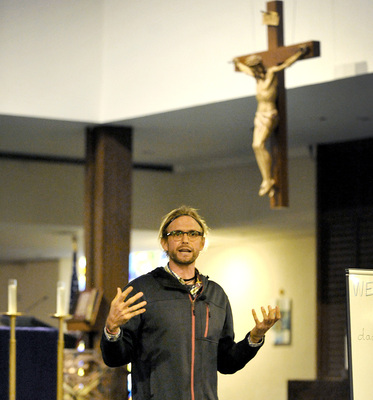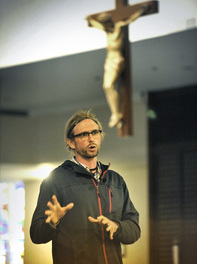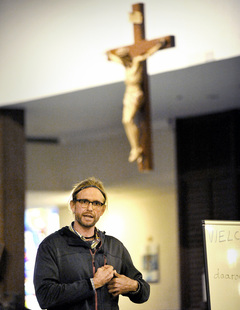
A platform that encourages healthy conversation, spiritual support, growth and fellowship

NOLACatholic Parenting Podcast
A natural progression of our weekly column in the Clarion Herald and blog

The best in Catholic news and inspiration - wherever you are!
The God of endless chances: A resurrection parable
-

Johnny Young, 35, admits that when he was in his early 20s, in the clutches of a heroin addiction, he used to poke fun at his mom, Mary Lou McCall, for going so frequently to eucharistic adoration.
“Where are you going – to talk to Jesus?” Johnny would ask derisively, already knowing the answer but just making sure his mom knew that he thought she was the crazy one.
It is difficult to identify exactly how Johnny’s life spiraled out of control, beginning as a teen, into an abyss of alcohol, drugs and despair. But there is no doubt the messy reality of what many outsiders might have viewed as a gilded upbringing contributed to his descent into years of hell with no visible exit.
Both of Johnny’s parents were polished and accomplished – in media (McCall) and in politics (his father is former Jefferson Parish President John Young). But as they struggled in their marriage, Johnny, the eldest of five sons, said he handled their parental discord and eventual divorce by medicating his pain.
 “It created a situation for me that I didn’t want to be around my family,” Johnny told a small group, which included both of his parents, at an archdiocesan Substance Abuse Ministry (SAM) meeting last month at St. Angela Merici Church in Metairie. “That, coupled with social pressures from school, trying to fit in, never feeling I was fitting in.”
“It created a situation for me that I didn’t want to be around my family,” Johnny told a small group, which included both of his parents, at an archdiocesan Substance Abuse Ministry (SAM) meeting last month at St. Angela Merici Church in Metairie. “That, coupled with social pressures from school, trying to fit in, never feeling I was fitting in.”One of the amazing things about Johnny’s life is that his alcohol and drug addiction did not cause his grades to plummet. He graduated from Jesuit High School and from the University of New Orleans, “which was my justification that everything was going well.”
“But once I finished college, I didn’t have a plan for that,” Johnny said.
Johnny’s family connections got him a job at Galatoire’s, where he bused tables in the mirrored main dining room. A chef quickly caught on that something wasn’t quite right.
“There were a number of times when I was just – for lack of a better word – wasted,” Johnny said. “And they were like, ‘OK, I think you need to go home.’ Everybody, my parents, the restaurant, gave me so many chances. There was this young guy, the head chef, and he sat me down in a stairwell. He asked me, ‘What’s going on? We’re not going to fire you, but we’re going to send you home.’”
And then, one day, Johnny broke another glass on Galatoire’s fabled white-and-black tile floor.
“I’m not even sure if I was really high at the time, but one of the managers said, ‘You’re going to take a drug test,’” Johnny said. “So, that was like the fifth chance. I was a hustler, I was good. I just had a drug problem. I was a mess – you could see it in my face. I was just becoming a liability.”
As his life cratered, Johnny hung on to something that, looking back to the beginning of his resurrection story, occurred in 2009. He had seen his parents disagree and argue about so many things, especially after Hurricane Katrina, that he was shocked when they both rallied to try to solve a problem together.
“It was basically like an intervention,” Johnny recalled. “It was like, ‘You’ve got to figure this out or we’ve got to figure out something together.’ That touched me – not necessarily at the moment – but it’s always something I remember. That was the first big step.”
McCall had worked for many years doing TV programs with former Archbishop Philip Hannan, and she remembered an interview she did several years earlier in Medjugorje. A community founded in 1983 by an Italian nun, Mother Elvira Petrozzi, was changing the lives of addicts through an austere regimen of prayer, work and friendship.
“She was a little nun who had a third-grade education and her father was an alcoholic,” McCall said. “She always spoke about it like it was her gift from God so that one day she could go out and help others.”
From Mother Elvira’s days of gazing out the kitchen window while doing dishes and seeing drug addicts walking the streets, she established the Missionary Sisters of the Resurrection, who now have opened 70 community houses for men and women around the world.
Getting Johnny into the community house in St. Augustine, Florida, on May 27, 2009, was an exercise both in prayer and coercion.
 “My parents and I drove up together – which is another kind of amazing thing,” Johnny said. “It was a show of solidarity for me, that I was worth something. But the whole ride up, I was using drugs. It was like my parents dragged me into that door, and once it started to become kind of like a challenge that I accepted, I was like, ‘Well, I’m not going to give up.’ I had just exhausted all possibilities.”
“My parents and I drove up together – which is another kind of amazing thing,” Johnny said. “It was a show of solidarity for me, that I was worth something. But the whole ride up, I was using drugs. It was like my parents dragged me into that door, and once it started to become kind of like a challenge that I accepted, I was like, ‘Well, I’m not going to give up.’ I had just exhausted all possibilities.”If the three “pillars” of the “Hope Reborn” community are prayer, work and friendship, Johnny was sure of two things early on: prayer and work were not for him.
“They told me about how much they prayed – a lot,” Johnny said. “It was three rosaries a day, prayers in the chapel and Mass a couple of times a week. I couldn’t get excited about that.”
The work was primarily mowing the grass, weeding the gardens and building small structures.
“But one thing that was really appealing to me were the rest of the guys,” Johnny said. “There’s no staff. Everybody there is in recovery and has a certain amount of time, and therefore has a certain amount of responsibility. They had something in their eyes, and that intrigued me a little.”
Transformed by adoration
Three months in, Johnny began to notice many of his new friends were waking up at 2 a.m. to go to the chapel for eucharistic adoration, the devotion he had chided his mother about so many times.“I was curious,” Johnny said. “I started out saying, ‘Wake me up, and I’ll go with you,’ and from that night on I went every night at 2 o’clock in the morning. It’s hard to explain, and it’s very personal to me, but it was eucharistic adoration that changed things for me.
“Eucharistic adoration in a very silent chapel – just God and me, a direct line of communication and just the silence – it was where I could really let God in to really do something in my life. It was me staring at God, and Jesus was staring back at me. That was where everything changed for me. It became the most important part of my prayer life, and the most important part of my life.”
After spending 14 months in Florida, Johnny traveled to two other community houses in Italy for three years and then, in December 2013, left for Liberia in West Africa, one month before the Ebola epidemic broke out. He served there for the next three years, caring for about 40 children whose families could no longer care for them.
“We were like the house parents,” Johnny said. “We taught them all the lessons of life, not just the academics. We called ourselves uncles.”
In the quiet of the adoration chapel in 2017, Johnny asked God what was next. The answer was to become director of Liberia Mission Inc., a missionary apostolate of the Chicago-based Franciscan Works.
“It’s just a bunch of Catholics trying to do good,” Johnny said.
Johnny and his staff provide faith formation, Catholic education and life skills to more than 500 poor and orphaned children, many of whom are survivors of Liberia’s 17 years of civil wars and of Ebola. The residential students have few, if any, formal learning opportunities.
Sacred retrospective
Johnny looks back to the shattered glass at Galatoire’s.“You know, I started out from nothing, from zero, like being broken down,” Johnny said. “I went through recovery, and I’ve been given this opportunity.”
This week, on Good Friday, Johnny will leave New Orleans to return to Liberia. He wants to get back for Easter, for the resurrection.
“It’s important for me because, I mean, that’s my family now, you know?” he said.
Contact Johnny Young at [email protected]. Go to FranciscanWorks.org to learn more about Liberia Mission Inc. The archdiocesan Substance Abuse Ministry (SAM) can be reached at (985) 707-7261.




